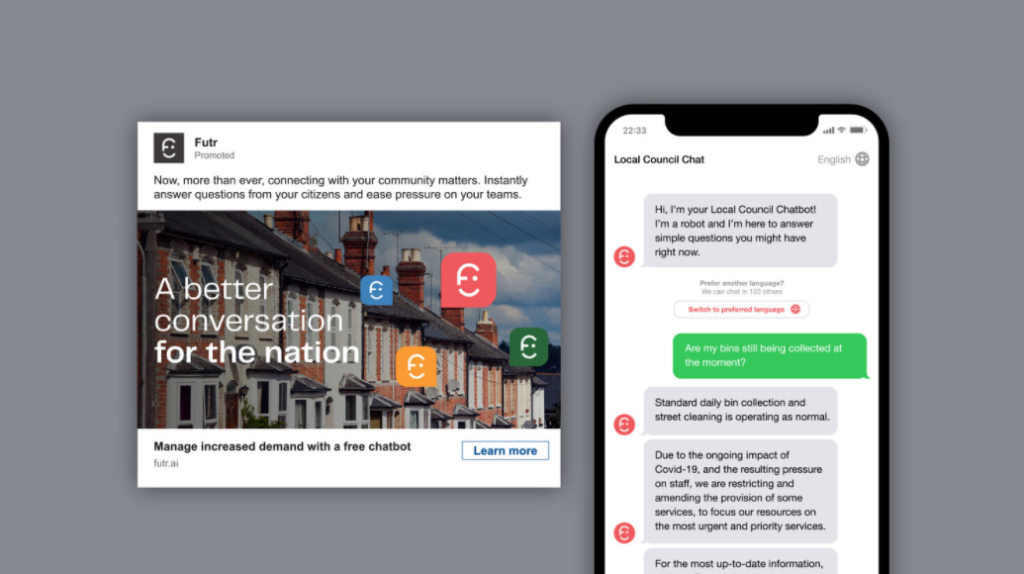By Andy Wilkins, CEO and co-founder at AI brand Futr
A new survey by McKinsey shows that Covid-19 sped up digital implementation by several years – in some sectors and regions by as much as ten. Businesses’ five-year strategies were crunched into just a few months, and digital adoption among consumers took a quantum leap.
Particular surges were noted in financial and professional services, healthcare and pharmaceuticals, critical response and local authorities. Perhaps not surprising given the nature of the pandemic and the areas in which it had the greatest impact. (FMCG and automotive assembly, for example, reported relatively low levels of change in their digital product portfolios.)
All this has shifted the conversation around the ways in which artificial intelligence (AI) and tech brands need to communicate with their consumers, both b2b and b2c. As tech businesses, we need to ask ourselves what we can do with our brand and marketing strategies to reflect this seismic shift.
Post-pandemic strategies
As an emerging AI chatbot player prior to the pandemic, one of the key roles of our brand strategy was to humanise AI and build trust. Confidence in AI was low. According to a survey by analyst Pegasystems, only 30 per cent of respondents felt comfortable with businesses that used AI chatbots to interact with them. A third believed that their jobs were at risk, with machines potentially taking over roles. There were concerns over unintentional bias among program developers; that AI chatbots lack empathy; and we’d come to mourn the loss of the human touch.
Putting down roots
We had a strong product – unlike regular chatbots, our multi-feature AI chatbots are able to understand user queries through natural language processing, give intelligent answers and seamlessly flow into existing workflows, which improves the overall user experience. But we were still establishing our market fit.
At that stage, the key thing was to break down barriers and build trust. We partnered with brand agency Lantern to create messaging that shows the positive impact Futr can have on internal teams; that it’s reliable, non-threatening and helpful. The design response reflects this. Alongside the logo, which is both an ‘F’ and a friendly human face that could be winking at you, there are authentic photographs that hero the end user, and a colour palette that steers away from the expected blues of the tech sector.
And it has continued to deliver over the past year and a half. But the consumer landscape has changed. Recent months have highlighted a need to evolve and amplify the existing framework in order to respond to fresh consumer needs, both b2b and b2c.
What’s next?
Brands do well when they embrace the need for change and aren’t afraid to progress. There’s a tendency to think that evolving a brand strategy will weaken a business and chase away existing consumers. But that’s the wrong view – what it actually does is refine and sharpen your offer, demonstrating agility and relevance. A well-though-through brand strategy will allow you to build, flex and grow seamlessly.
When you team up with a branding agency and work together, it’s the start of a journey not the end. A brand isn’t something you ‘do’ and then shelve – it’s a living, breathing thing to be woven through day-to-day business, informing decisions, responding to shifts and creaks in real time.
Going up a gear
As our brand has worked hard to disabuse people of the notion that they should be threatened by AI, we’re now looking at shifting up a gear and focusing more on how it augments people’s lives. There’s a continuing education job to be done, but because of the pandemic we’re further down the road and more people get it – and understand that AI already exists in so many areas of their lives.
We’ve honed our market fit and now focus fully on enhancing the powers of critical response services, housing organisations and mental-health charities. Medical professionals, police officers and mental-health call-centre staff have all done an exceptional job, especially over the past few months, but they’re overwhelmed by the changing nature of 24/7 digital demand. AI products are helping them to do the best job they can – from out-of-hours chatbots, to enabling live-chat agents to communicate instantly in more than 120 languages, and across all social media channels. AI is making these functions more accessible to everyone and democratising essential services.
It makes sense that as your business grows and develops, your brand should reflect a fresh and up-to-date image of your company. And with all the changes that have been happening in our sector in recent months, that’s more important than ever.









